Tag: Joe Clancy ’18
John Oliver and Murray Energy Go Head-to-Head
by The Cowl Editor on August 31, 2017
Arts & Entertainment
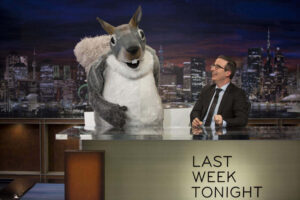
by Joe Clancy ‘18
A&E Staff
Four years ago, HBO teamed up with former Daily Show correspondent John Oliver to launch the massively successful satirical show, Last Week Tonight with John Oliver.
For a brief period in the summer of 2013, British comedian Oliver took over as host of The Daily Show, when Jon Stewart was off filming his movie Rosewater. This opportunity gave Oliver the attention of a massive audience as he showed off his ability to brilliantly humorize the news.
Throughout Last Week Tonight’s run there have been countless episodes in which Oliver has used satire. His style has made him famous as he covers issues not generally discussed in the 24 hour news networks.
For instance, Oliver made a surprise visit to Russia to interview Edward Snowden about National Security Agency spying. The comedic focus of the interview was an example of a certain type of explicit picture, but the interview also offered some informative points.
Oliver has also delivered several hilarious rants about the Fédération Internationale de Football Association (FIFA), Net Neutrality, and, of course, Donald Drumpf (Trump).
This June, Oliver decided to tackle President Trump’s decision to pull out of the Paris Climate Agreement and scale back on Obama-era regulations on coal. Originally, Trump and his administration were supposed to be the main target of the segment.
However, this all changed when Bob Murray sent Last Week Tonight a cease and desist order before the show even aired. Murray is the CEO of Murray Energy and told Last Week Tonight that if Oliver spoke ill of him or his company, they would sue.
Nevertheless, Oliver did not back down and hilariously roasted Bob Murray. As promised, Oliver started the rant about Trump and then moved on to Murray, saying, “I really did not want to spend so much time talking about you but you gave me no choice, Bob.”
Oliver then went into detail about some of the black eyes the company has had. For starters, Oliver covered a mine collapse in 2007, which led to the death of several employees due to unsafe working conditions that Murray Energy neglected to fix.
Oliver also went on to talk about the bonuses the company gave out one year that were comically small amounts. There was also the comparison of Murray to Dr. Evil, and the kicker of the rant was the introduction of the life size squirrel.
The squirrel, Mr. Nutterbutter, was a joke about an alleged experience Murray had as a young man with a talking squirrel. The show concluded with Mr. Nutterbutter presenting Murray with an actual bonus check of three dollars, with the written memo saying, “eat [expletive] Bob!”
Murray kept his promise and is currently suing Oliver and Last Week Tonight for defamation. Oliver has the backing of both HBO and Time Warner, but he also picked up a key ally earlier this month, West Virginia’s American Civil Liberties Union (ACLU). The ACLU says that they support Mr. Oliver’s exercise of the First Amendment.
This case could turn out to be a devastating loss both financially and for the reputation of Murray if Oliver wins, which seems to be the most likely case. The case will surely be an unusually humorous court appearance, as Mr. Nutterbutter will be used as evidence.
One thing is for sure, Oliver will keep on dishing out the hilarious punches.
Bob Dylan: A Living Legend Now Enshrined
by The Cowl Editor on April 6, 2017
Arts & Entertainment

by Joe Clancy ’18
A&E Staff
Bob Dylan, the backwoods-born, folk-singing, outspoken, and recently awarded Nobel Laureate, continues to build upon his quirks. The latest addition to Dylan’s eccentric story is the creation and opening of an archive dedicated solely to him. Normally, it would seem strange that a musician would have a museum dedicated to himself before he or she dies, but Dylan is by no means normal. At the age of 75, the artist simply proves that genius ought to be awarded no matter the time, genre, or age.
The Bob Dylan Archive, located in Tulsa, Oklahoma, is now open to researchers wishing to learn more about the artist and growing legend. The archive will soon feature a more public venue, but for now features over 6,000 artifacts collected from various points in Dylan’s life. This includes a variety of primary sources such as lyrics, photographs, contracts, private letters, and both video and audio recordings.
For those who wish to write scholarly criticism on the artist, these resources are precious. Randall Fuller, a professor of English at Tulsa University, plans to utilize the archive in his project of writing a book on the relationship between Dylan and African-American music. “The Bob Dylan Archive is an invaluable resource for this project,” he said. “I’m discovering so many revelations in the songwriter’s exploration of blues, gospel and soul forms. Without access to the archive, my book would be all but impossible.”
According to the archive’s curator, Michael Chaiken, the audio and film reels would take about 113 days to watch and listen to consecutively. All of it though, Chaiken says, is valuable. For the curator, the outtakes from the recording studio were particularly rewarding to hear. “He’s like a Miles Davis character…,” he says, “there’s so much improvisation going on and moving things around, trying to find the rhythm.”
The very location of the archive seems to capture the artist’s off-beat nature. Many are still confused as to why Dylan would have his works brought to Tulsa when the city is not overtly important to the artist nor is it home to an Ivy League school. Dylan was born in Duluth, Minnesota and gained the majority of his fame in New York City, so the choice of Tulsa left many scratching their heads.
That, however, is part of the legacy of the voice of a generation. Dylan has always avoided convention and will always provoke his audience to ask, “why?” The archive may prove to answer some questions about him, but it seems there will always be more Dylan to be discovered and understood.
The Legacy of Chuck Berry, Rock Pioneer
by The Cowl Editor on March 23, 2017
Arts & Entertainment
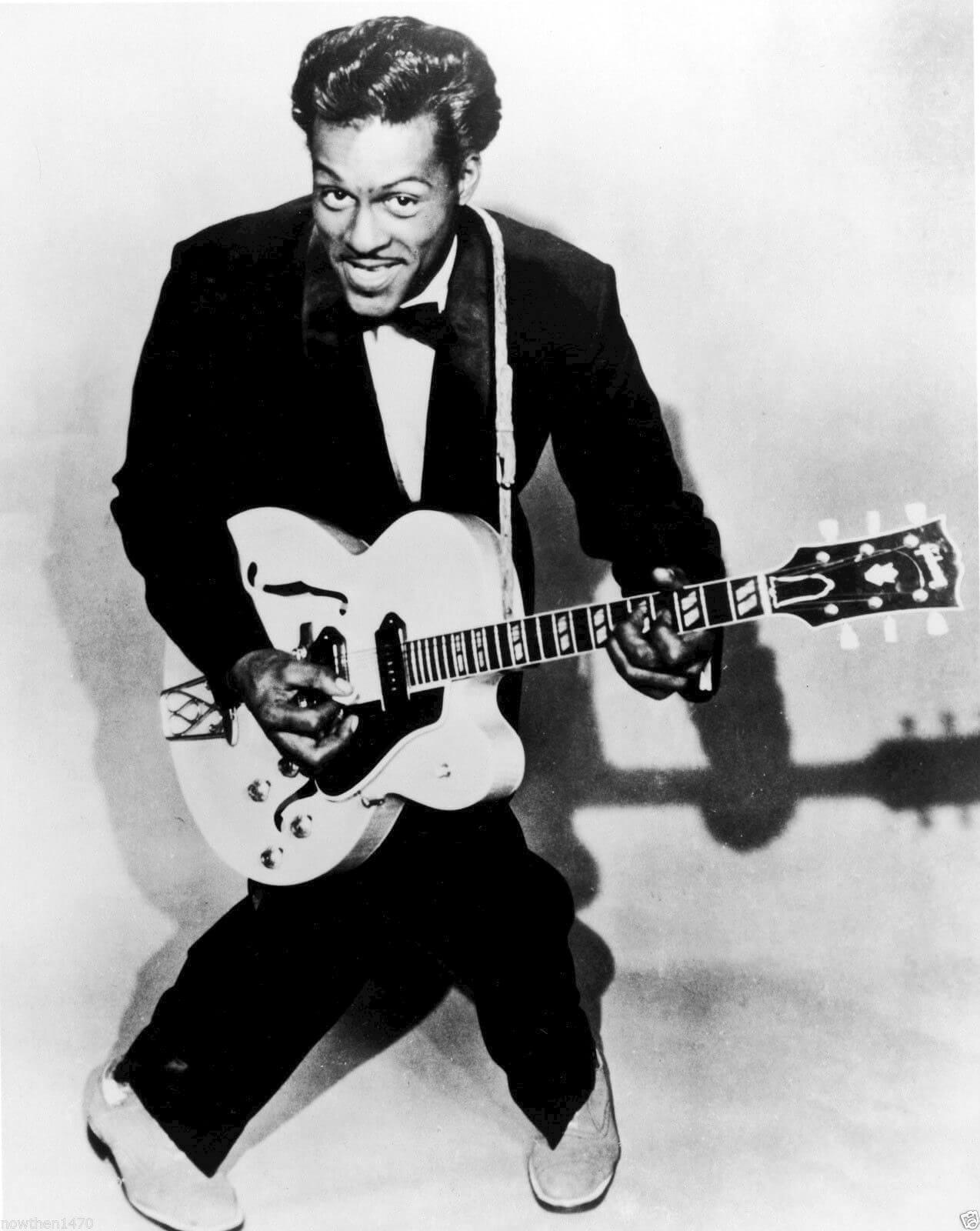
by Joe Clancy ’18
A&E Staff
This Saturday, Chuck Berry, one of the biggest stars in rock and roll history, left the world silent in honor of all he had accomplished and given to the music industry.
Often called the “father of rock and roll,” Berry began his career in 1953, and since he loved music so much, only really left the stage on Saturday, March 18.
Berry was born in 1926, and as a young man, was on a path to crime and obscurity. However, this changed in 1953 when Berry started performing with Johnnie’s Johnson’s trio. Berry’s collaboration with the group came at a time when there was widespread stigma surrounding rock and roll among white audiences, because of the association with African American culture.
Despite this, Berry was able to overcome some of the prejudice and surprisingly became very popular among rural white Americans. His breakthrough came in 1955, when he released his number one hit “Maybellene.” Berry went on to further success as he released hits like “Johnnie B Goode” and “Rock and Roll Music.”
His songs were unique and innovative, in the sense that they focused more on guitar riffs than previous generations recordings. Although the songs were short, they were fast paced and capitative. Berry also helped focus rock and roll around what it is known for today.
While performing, Berry also helped innovate the classic showmanship associated with rock and roll acts. Berry’s style was electric both in guitar and in his movements on stage. Berry was synonymous with “rocking your body” while he danced and played. He even invented a coveted rock move “the duck walk” which saw Berry essentially hopping from one end of the stage to another. Berry would often improvise his music and movements, to give rock that seductive feel for a newly established teenaged audience, who craved it during 1950s conservative America.
Berry was a pioneer, especially as he influenced countless artists that were considered to be some of the greatest musically acts of all time: The Beatles, the Rolling Stones, and even Bob Dylan. John Lennon once said that if rock and roll were to be renamed, it would be “Chuck Berry.” Dylan, who is often cited as one of the most gifted lyricist of all time, said that Berry was “the Shakespeare of rock and roll.”
Now Elvis may have the title with some as “the King,” however, Berry is truly rock’s father. Berry brought rock not only to the charts but he opened the genre up to a whole new population. Berry not only introduced America to what rock could become, but he ultimately helped shape its future. There is no doubt, that Berry is truly one of the great innovators of rock and roll.
New Jokes and New Fans, 600 Episodes Later
by The Cowl Editor on March 16, 2017
Arts & Entertainment
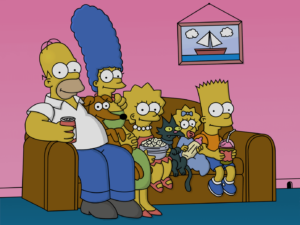
By Joe Clancy `18
A&E Staff
For nearly 30 years, The Simpsons have been the satirical face of the average working class American family. The show first aired in 1989, and just recently celebrated releasing its 600th episode, making The Simpsons one of the longest running television shows in history.
After all, the show has received 32 Emmys and has even seen Homer’s catchphrase “D’oh” become adopted into the English language. In a 30 year run, it is often hard for a show to maintain relevance and popularity, especially in an era of greater choice of media outlets and changing generational preferences. The Simpsons have been the exception to the notion that popularity fades and have proved to be more of a fine wine of shows, as their 28th season and general presence in the American psyche has never been stronger than it currently is now.
The Simpsons centered their show around the wide scope of the American way of life, featuring characters that represent all types of groups in the country. From Ned Flanders’ religiousness, to Mr. Burn’s arrogant wealth, to Disco Stu’s obsession with the mid ’70s music fad, there are endless possibilities for the writers to channel a narrative for nearly every demographic.
Before the 28th season had even aired in September 2016, The Simpsons were all over the internet and public forum because of an episode they shot in 2000, which showed the middle child of the iconic family, Lisa, being President after a Donald Trump administration.
To follow up their eerie prediction, the first episode following the election featured the family son, Bart, being stuck in detention having to write on the black board, “Being right sucks” in the opening credits. This scene helped the show gain even more traction and publicity on the internet, especially among younger millennials who are not as familiar with the show as older generations.
The show has had even more success attracting a younger demographic as they have episodes that focused around satirizing President Trump’s controversial Trump University and the blind popularity of the Pokémon Go App among America’s youth. The new season is also showcasing very popular guest voices. For instance, Amy Schumer, Bill Burr, Stephen Curry, and rappers Snoop Dogg and Common have all made appearances in the 28th season, helping the show further gain popularity while relating to the younger generations.
The Simpsons have also hired guest stars this season who will attract their original audiences like movie star Michael Sheen and Seinfeld legend Jason Alexander.
Overall, the 28th season has boasted shows that have seen audiences of more than eight million viewers, which is no easy task for a Sunday night show in the wireless period.
When it comes down to it, The Simpsons have such eloquent and expanded writing for their show that it is easy for the show to adapt to the changing American culture, especially in these uncertain times. One thing is for sure, The Simpsons will remain America’s family for a long time to come.
Celebrating Film in Dramatic Fashion
by The Cowl Editor on March 2, 2017
Arts & Entertainment
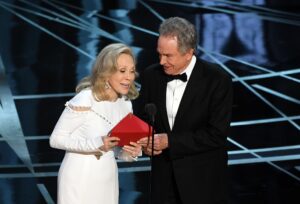
By Joe Clancy `18
A&E Staff
“And the winner is…,” well, that is a good question. This Sunday, February 26, the audience of the 89th Academy Awards heard that phrase a lot, in fact, one too many times. Going into the night, there were two heavily favored films to win Best Picture: La La Land, a film honoring the golden age of Hollywood, and Moonlight, a drama focusing on a homosexual black man trying to escape poverty. In deciding the award, the Oscars’ pageantry gave the audience a twist ending one could only hope to find in Hollywood.
Warren Beatty and Faye Dunaway, co-stars in the film Bonnie and Clyde, essentially stole the show when they came out to present the final and most prestigious award for Best Picture. Dunaway announced the win for La La Land and the cast congregated onto the stage to accept the award. Just as the director, Damien Chazelle, was giving his acceptance speech, it was announced that there was a mistake, and Moonlight had actually won the award. Everyone was shocked, including the cast of Moonlight, which became the first film with an all-black cast and LBGTQ plot to win.
In the immediate aftermath, it appeared that either Beatty or Dunaway was at fault, but they were just the messengers. PricewaterhouseCoopers (PwC), the corporation in charge of calculating winners, released an official statement explaining the mistake: “PwC Partner Brian Cullinan mistakenly handed the back-up envelope for Actress in a Leading Role instead of the envelope for Best Picture to presenters….” It was innocent and candid, but the mix-up still left all in attendance and watching from home baffled.
Up until that point, La La Land and Moonlight had dominated the night. Coming into the Oscars, the two pictures held 22 nominations in the 24 categories. La La Land was nominated for 14 awards, including two separate nominations in the Best Original Song Category. Moonlight had received eight nominations.
The two films had also done very well with previous award ceremonies. During the Golden Globes, La La Land was nominated for Seven awards and won in all seven categories, making it the most awarded movie in Golden Globe history. Moonlight received six Golden Globes, making it the second most awarded movie in Golden Globe history. Among the Golden Globes brought in by the two films were Best Picture in both film categories, as well as Best Musical and Best Drama, respectively.
In the wake of the incident and its accompanying confusion, the director of Moonlight, Barry Jenkins, accepted the award saying that he had dreamed of the moment and was shocked it actually happened. He was not alone in a number of ways. Despite the mayhem, the mix-up seemed a fitting end to Oscar night—with an entire event dedicated to cinema and spectacle, a little drama was in order.
Making SNL Relevant Again
by The Cowl Editor on February 16, 2017
Arts & Entertainment
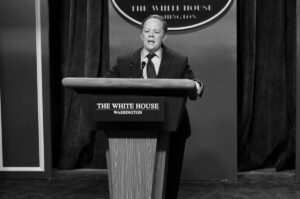
By Joe Clancy `18
A lot has happened in President Trump’s first 100 days; executive orders and protests seem to dominate the news reel every day. One unprecedented change, however, is the surging popularity of Saturday Night Live (SNL).
With Alec Baldwin playing President Trump and Melissa McCarthy as the White House Press Secretary Sean Spicer, satirical impersonations of the new administration have propelled Saturday Night Live to its most popular season in over 20 years.
Since the beginning of this season, SNL has averaged a viewership of 10.64 million, numbers the show has not achieved since 1994. This past Saturday’s episode recorded 10.8 million viewers, which was its most watched episode since January 8, 2011.
One of the most impressive feats this season is SNL’s rating among adults under 50. Including DVR replays, this season’s ratings are up 20 percent from last season—a statistic that starkly counters the notion the show is failing.
In an interview with the Los Angeles Times, Political Analyst Larry Sabato said SNL’s recent success can be explained through its role as an outlet. “People who hate Trump need to gather together,” he said. “Sometimes it’s in the streets and sometimes it’s watching a show like ‘Saturday Night Live.’” Unlike angry Facebook posts or Tweets, Sabato says outlets like the sketch-comedy show are “a kind of Pepto-Bismol for the bile that’s building all week long.”
SNL, the 1975 brain child of Lorne Michaels, is no stranger to the political scene. It has proven to be popular around the water cooler every Monday morning since its founding, especially during election seasons. The show has even been credited with the “Saturday Night Effect,” the electoral influence attributed to the show’s political coverage. This influence became even more evident in the 2008 election when SNL heavily satirized the then Vice Presidential candidate Sarah Palin. Due to Tina Fey’s impression of Palin, “I can see Russia from my house” was widely attributed to the VP candidate even though she never said it.
The current season seems to be just as impactful, having even caught the attention of President Trump himself. In reaction to portrayals of himself and his administration, the President has recurrently tweeted severe criticisms of the show. President Trump has called SNL “really bad television,” “not funny,” and Baldwin’s impersonation of him “unwatchable.”
For some, the heavy political satire in this season of SNL exemplifies its comedic genius, whereas others think the show is picking low hanging fruit. Regardless of how the satire is received, however, one thing is indisputable: it’s working.
‘Apple Stream’: Better Late than Never?
by The Cowl Editor on February 9, 2017
Arts & Entertainment

By Joe Clancy `18
A&E Staff
When you think of having a night in and streaming a movie, you probably think of Netflix or Hulu. What about Apple? It seems strange that one of the country’s largest electronics producers is not in the market for online streaming. That, however, may be changing soon.
The Wall Street Journal recently reported that Apple plans to begin their own streaming service, supplemented with multiple original series. Although there is no official launch in sight, executives at Apple have said they wish to start offering content by the end of 2017.
Apple’s decision seems to be a no-brainer, rather late if anything. The online streaming industry is both lucrative and growing. According to MarketsandMarkets the industry is projected to be worth 70 billion dollars by 2021.
Apple is one of the biggest companies in the world and has had massive success when it comes to creating technology to view media like music, video, books, and launching innovative products such as the iPod and iPhone. However, 2017 is seeing Apple’s sales fall for the first time since 2001, which has mostly been blamed on the iPhone 7’s stagnant sales. Due to its recently sluggish sales, the 234 billion dollar company looks to extend its production into the online streaming and producing industry.
This industry, however competitive it may be, will offer a large market of subscribers Apple can tap into and boost revenue for their company, especially as more and more channels and providers start streaming their content online. Almost every channel now offers the option of online streaming. Even the NFL has started live streaming their games through outlets like FOX sports and have even streamed content on Twitter.
Apple, a company that prides itself on being innovative, will have to really step up their game and offer a new and unique show. When it comes to producing online content, it is hard to break away from the competition and attract viewers.
According to NPR, Netflix after all spent nearly $100 million to produce House of Cards in 2013, which is no petty investment. Apple will also have to find actors and directors that are bound to create a massive hit and not accept any failures. When it comes to producing new content, there is usually a learning curve that companies will face, so Apple will have to do their best work in hope of attracting distracted viewers especially when one looks at the standings of the industry now.
Take Netflix, for instance, which was established in 1998 as an alternative to traditional movie stores like Blockbuster and offered shipping DVDs to people’s homes to avoid the car ride to the video store. However, in 2013 that all changed when Netflix released its streaming original House of Cards, which proved to be a breakout hit as it has gone on to win six emmys. Netflix again reached massive success in 2016, as nearly 17 million people streamed their original content of Orange is the New Black and Fuller House.
According to NPR, Netflix was able to receive an additional 7 million subscribers alone in the most recent business quarter of 2016. Hulu originally started off as a third party streaming service that offered viewers the ability to watch shows that they had missed the night before. Hulu eventually started producing programming like Stephen King’s 11/22/63 and has seen a massive spike in subscribers. If Apple is going to be able to break through in this industry, they will definitely have to produce content that will captivate their audience.
Always the Activist: Al Gore Fights Climate Change in An Inconvenient Sequel
by The Cowl Editor on January 25, 2017
Arts & Entertainment

by Joe Clancy `18
A&E Staff
Al Gore has one of the most decorated and extensive resumes not only in the American political scene, but in the environmental and artistic fields as well. The former vice president narrowly lost the race for President of the United States in 2000, but still managed to remain a dominant figure in American culture and entertainment.
Gore’s most recent feat is a sequel to his hit documentary: An Inconvenient Truth. The film, rightfully named An Inconvenient Sequel, comes eleven years after its predecessor. It was released this January 2017 during the Sundance Film Festival and reiterates many of the same messages Gore’s previous film had made.
Unlike some former presidents and vice presidents who take their retirement to paint, Al Gore rivals former President Carter for the amount of activism work he has done. Gore took it upon himself to become the face of climate change awareness. In the early 2000’s, environmental activism was waning as non-environmental interests took a hold of policy and regulation in Washington.
In 2006, Al Gore and film director Davis Guggenheim began work on their groundbreaking documentary, An Inconvenient Truth. The film focused its attention on Al Gore’s efforts to reinvigorate the environmental movement by educating the public about the pending threats facing the planet.
The film was released at the Sundance Film Festival in January of 2006. An Inconvenient Truth was an instant success and it became the 10th highest grossing documentary of all time while simultaneously being applauded by critics. The film would ultimately go on to win the 2007 Oscar for best documentary.
An Inconvenient Truth has been cited as a massive cornerstone of the environmental movement and helped raise a great deal of awareness among the public about climate change. The film also helped Al Gore win the Nobel Peace Prize in 2007.
In 2011, Gore continued fighting the issue when he founded the The Climate Reality Project, which aims to raise awareness and help fund efforts to fight climate change. Around 2014, Guggenheim decided that the public should still be exposed to the issue and be able to see what has been happening since 2006.
The release of the sequel comes on the heels of the 2016 election, which resulted in a very similar political environment as in 2006. An Inconvenient Sequel aims to follow in the predecessor’s success of advancing the public’s conversation on the issue.
